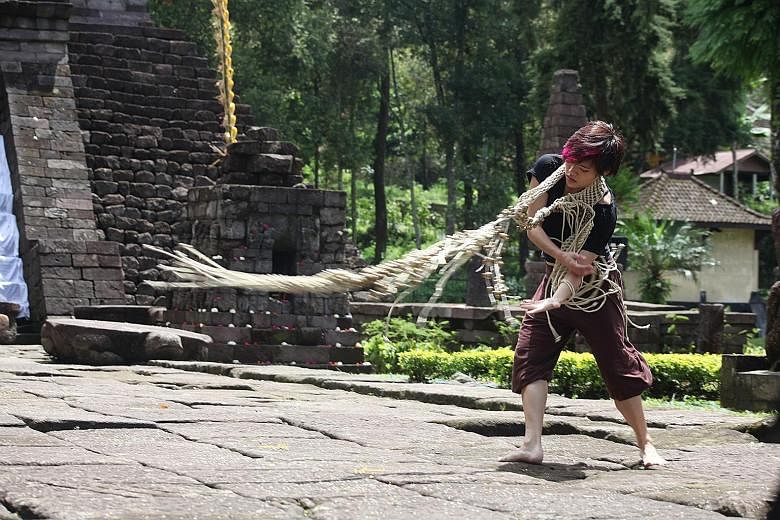When she was 20, dancer Chan Sze-Wei was a political science major at Columbia University in the United States, bound for a career in the Ministry of Foreign Affairs.
Then, she stepped into an introductory modern dance class.
"I started dancing for fun when I was in university and fell in love with it. But I had a scholarship bond to serve and came home with a lot of regret," she recalls.
"Then, things didn't work so well in my civil service career and my life felt like it was falling apart. I began to consider leaving. I realised that I wouldn't forgive myself if I didn't give dancing a chance, even if it was a very long and unlikely shot."
-
BOOK IT / THE THIRD SPACE: CONTEMPORARY ASIAN EXPLORATIONS IN DANCE BY THE NANYANG ACADEMY OF FINE ARTS
-
WHERE: Esplanade Recital Studio, 1 Esplanade Drive
WHEN: Oct 21, 7.30pm and Oct 22, 6pm
ADMISSION: $18 from Sistic (Call 6348-5555 or go to www.sistic.com.sg)
In 2008, she left her job at the ministry to enrol at the Nanyang Academy of Fine Arts (Nafa), where she immersed herself in dance.
Chan, 36, graduated with a Master of Arts in contemporary dance from the London Contemporary Dance School last year and has churned out works of her own.
One of them, The Membrane Of The Earth's Silence, will be showcased as a video work at an upcoming dance show at the Esplanade Recital Studio, The Third Space: Contemporary Asian Explorations In Dance by Nafa.
It is produced, directed, choreographed and edited by Chan, with two of her dancer friends - Titisa "Ice" Jeamsakul and Zunnur Sazali - performing in it.
Part of the Esplanade's da:ns festival, the show on Oct 21 and 22 features works by Cultural Medallion recipient and dance pioneer Lim Fei Shen and Maya Dance Theatre's Shahrin Johry.
You got into dance fairly late. What were the challenges you faced?
It took me a long time to consider myself an artist. For a long time, I thought of it as a serious hobby and so did my family and friends.
I struggled for several years with the decision to leave my civil service job and go back to school with dancers 10 years my junior.
What are your pre-show rituals?
I always carry a lot of nervous energy to live performances. I try to get some time to lie and stand on the stage or performing space to sense the venue's size and energy and imagine it full of human presence.
I've never told anyone about this - before the house opens, I'll stand on stage and do an Odissi namaskaram. It's a short sequence performed before and after practice and performance, in which one seeks the blessings of the earth and salutes the gods, one's teachers and the audience.
Each classical Indian dance form has its own version. I learnt this one when I studied and performed for several years with Raka Maitra (the artistic director of dance troupe Chowk Productions).
It calms my nerves and helps me feel connected to something greater, whether I'm in Asia or in Europe.
What is the harshest criticism you have received and how do you deal with it?
Probably the most brutal was during a contemporary dance exam in my final year at Nafa, when I was performing combinations for assessment.
I had been injured, so I was taking it solo as a make-up exam, instead of the usual group format.
The examiner criticised me throughout the exam from the first exercise - unusual for that setting - and I was rattled.
She said things such as, "You don't even make me want to look at you. Try harder. You call that performing? Don't expect that you will be a dancer unless you figure out exactly what you want to do and what is unique about you. In technique, there will always be other dancers stronger than you. Look at me when I talk to you. You look like you're going to cry."
I had already been crying through the last few combinations, but was pretending it was perspiration.
She continued: "You can't even tell me confidently what you want to do. Learn to speak about it. Find your own language."
I consider myself a strong person, but I was breaking down for days even thinking about the event. Another teacher who was also assessing me told me it was the most brutal assessment he'd ever seen.
I look back now and being "burnt" was a big kick in the bum that eventually motivated me to be more focused and determined.
I get by with a thought from another of my teachers, Dr Filomar Tario: "What doesn't kill you will kill someone else."


